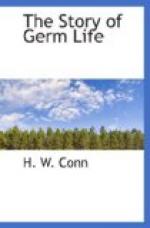All this is, of course, a natural process. The recovery from a disease produced by the invasion of parasitic bacteria depends upon whether the body can resist the bacterial poisons long enough for the recuperation of its resisting powers. If these poisons are very violent and produced rapidly, death will probably occur before the resisting powers are strong enough to drive off the bacteria. In the case of some diseases the poisons are so violent that this practically always occurs, recovery being very exceptional. The poison produced by the tetanus bacillus is of this nature, and recovery from lockjaw is of the rarest occurrence. But in many other diseases the body is able to withstand the poison, and later to recover its resisting powers sufficiently to drive off the invaders. In all cases, however, the process is a natural one and dependent upon the vital activity of the body. It is based at the foundation, doubtless, upon the powers of the body cells, either the phagocytes or other active cells. The body has, in short, its own forces for repelling invasions, and upon these forces must we depend for the power to produce recovery.
It is evident that all these facts give us very little encouragement that we shall ever be able to cure diseases directly by means of drugs to destroy bacteria, but, on the contrary, that we must ever depend upon the resisting powers of the body. They teach us, moreover, along what line we must look for the future development of curative medicine. It is evident that scientific medicine must turn its attention toward the strengthening and stimulating of the resisting and curative forces of the body. It must be the physician’s aim to enable the body to resist the poisons as well as possible and to stimulate it to re-enforce its resistant forces. Drugs have a place in medicine, of course, but this place is




